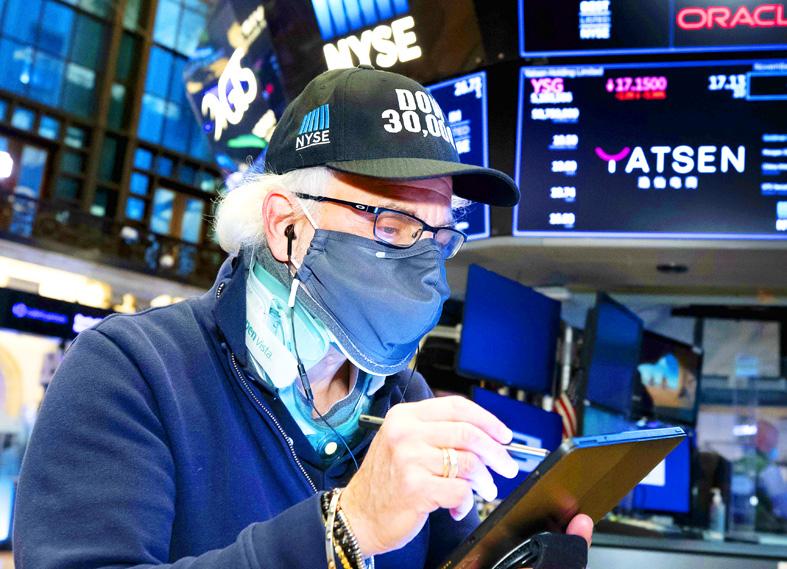Good or just lucky, US president-elect Joe Biden’s first three weeks in the stock market have been historically solid ones when measured against newly elected presidents of the past.
It is obviously very early, but the market reality has been the opposite of what US President Donald Trump predicted for his rival — a crash.
Since election day on Nov. 3, the S&P 500 has surged 7.7 percent, the second-best gain in 90 years and nearly triple the advance that followed Trump’s 2016 victory.

Photo: AP / New York Stock Exchange
The index has closed at a record three times, and gauges of smaller companies and global assets have hit new highs.
“Markets are looking at Biden’s actions, and so far, they like them,” StoneX global market strategist Yousef Abbasi said.
To be sure, the president-elect has been the beneficiary of some fortuitous tailwinds, most notably data suggesting various COVID-19 vaccines hold promise.
In the meantime, he is getting no help from valuations — which at 22 times forward earnings and 2.7 times sales are some of the highest multiples ever recorded — never mind just for a new presidency.
“That combination of relief politically, as well as positive surprises on the healthcare front, really surprised the market in a good way,” Vantagepoint Investment Advisers chief investment officer Wayne Wicker said.
“Coming into the month, people were quite concerned with the presidential election. I don’t think anybody was planning on such a blockbuster month,” he added.
Trump made the equity market his report card, and by that measure his grades were exceptional, his administration coinciding with a 57 percent surge in the S&P 500, the sixth-best for a new administration.
Skeptics love to point out that the link between presidents and stock performance is tenuous, that markets usually go up and that Trump’s S&P 500 record was very similar to his predecessor’s, Barack Obama.
All those things are true, though none of them kept him from saying of Biden: “If he’s elected, the stock market will crash,” in front of 60 million debate viewers.
Trump this week, in a brief appearance, touted the Dow Jones Industrial Average’s first-ever rally above 30,000.
Along with vaccine optimism, the index was aided by some of Biden’s appointments — mainly former US Federal Reserve chair Janet Yellen, who is seen as embracing stimulus as secretary of the US treasury.
Angelo Kourkafas, investment strategist at Edward Jones, said that markets are also welcoming of Biden’s more inclusive foreign-policy outlook and are expecting less headline volatility when it comes to trade relations.
“We’ve seen some reduction in political-uncertainty risk,” he said in an interview.
“If we are able to maintain the current favorable environment while at the same time reduce some of the headline risk with trade, that’s probably a good outcome for the markets,” he said.

Among the rows of vibrators, rubber torsos and leather harnesses at a Chinese sex toys exhibition in Shanghai this weekend, the beginnings of an artificial intelligence (AI)-driven shift in the industry quietly pulsed. China manufactures about 70 percent of the world’s sex toys, most of it the “hardware” on display at the fair — whether that be technicolor tentacled dildos or hyper-realistic personalized silicone dolls. Yet smart toys have been rising in popularity for some time. Many major European and US brands already offer tech-enhanced products that can enable long-distance love, monitor well-being and even bring people one step closer to

Malaysia’s leader yesterday announced plans to build a massive semiconductor design park, aiming to boost the Southeast Asian nation’s role in the global chip industry. A prominent player in the semiconductor industry for decades, Malaysia accounts for an estimated 13 percent of global back-end manufacturing, according to German tech giant Bosch. Now it wants to go beyond production and emerge as a chip design powerhouse too, Malaysian Prime Minister Anwar Ibrahim said. “I am pleased to announce the largest IC (integrated circuit) Design Park in Southeast Asia, that will house world-class anchor tenants and collaborate with global companies such as Arm [Holdings PLC],”

Thousands of parents in Singapore are furious after a Cordlife Group Ltd (康盛人生集團), a major operator of cord blood banks in Asia, irreparably damaged their children’s samples through improper handling, with some now pursuing legal action. The ongoing case, one of the worst to hit the largely untested industry, has renewed concerns over companies marketing themselves to anxious parents with mostly unproven assurances. This has implications across the region, given Cordlife’s operations in Hong Kong, Macau, Indonesia, the Philippines and India. The parents paid for years to have their infants’ cord blood stored, with the understanding that the stem cells they contained

Sales in the retail, and food and beverage sectors last month continued to rise, increasing 0.7 percent and 13.6 percent respectively from a year earlier, setting record highs for the month of March, the Ministry of Economic Affairs said yesterday. Sales in the wholesale sector also grew last month by 4.6 annually, mainly due to the business opportunities for emerging applications related to artificial intelligence (AI) and high-performance computing technologies, the ministry said in a report. The ministry forecast that retail, and food and beverage sales this month would retain their growth momentum as the former would benefit from Tomb Sweeping Day